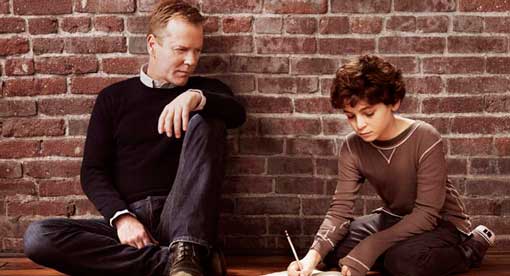
Tim Kring has a lot to make up for. As the creator of Heroes, he made a compelling story that in less than a season fizzled out into a burst of fate hokum and ridiculous storylines that seemed more soap opera than comic book. Kring knew how to start off a series, yet didn’t know how to follow it up into a show worth watching. With his newest show Touch, he once again gets started on the right foot, yet after the large scale of “Pilot,” it’s hard to see where the show can go from here.
Touch brings Kiefer Sutherland back to TV as Martin Bohm, whose wife died in the World Trade Center. A former journalist, Bohm now works handling luggage in JFK and taking care of his son who has never spoken. His son Jake is fascinated with numbers, yet has gotten in trouble too many times climbing the same electrical tower three times at exactly 3:18 p.m. Jake is put into social care due to his actions, yet Martin soon starts to see that Jake’s obsession with numbers may actually have a purpose and could be Jake’s way of talking to his father.
Martin meets with Professor Arthur DeWitt, played by Danny Glover, who believes that Jake may very well know the secrets and interconnectivity of the universe and that Martin should follow the paths Jake sets out for him. Throughout “Pilot” we see Jake’s numbers connect seemingly unrelated people in a way that borders on ridiculous but works surprisingly well. For example, we see how Jake’s actions connect his father continuously with a man he keeps getting in fights with. It turns out this man used a specific set of numbers to win the lottery. Jake uses these numbers in a way that leads the lottery winner to admit to Martin that he was a former firefighter who attempted to save his wife on 9/11.
The show’s other way of showing how we are all connected is through a stray cell phone that travels from the United States to Ireland, then to Japan and finally to Baghdad, influencing and helping everyone who uses the cell phone. Once again, it doesn’t sound like this should work, but the show makes you believe the incredible coincidences. One such coincidence is when a teenager uses the phone as a bomb in Baghdad as a way of purchasing an oven for his mother who just lost hers. Right before blowing up the bomb, he receives a phone call from an operator trying to help the original owner find his lost phone. And what exactly does the original owner sell? Kitchen supplies. Sounds silly, but “Pilot” makes it work.
This sprawling story that takes place all across the world makes the show instantly interesting, yet it leaves us with the question of where the show can possibly go from here. It seems like it could go into three directions: One, the show could weekly feature a similar style which just repeats the same basic ideas. Two, the show focuses more on smaller, more basic connections. Or three, it shows an overall web of connections over the course of the season, but from the looks of it, this seems the least likely of scenerios.
Which is where I come back to Kring. He’s created some interesting characters in the father and son duo of Martin and Jake, and the connections of seemingly unrelated people are fun to watch, almost like a more uplifting version of Babel. Sutherland is particularly good here, as a character that doesn’t resemble Jack Bauer in any way, which is a welcome change. But the worry here is that we’ve seen this type of front-loaded show from Kring before, where he amazes at first, then quickly disappoints. That may not seem fair, but it is hard to tell where this show will go from such a high point. But unlike Jake, I can’t see the patterns that may be set up here. “Pilot” on its own is an entertaining hour of television, regardless of whether or not the show can continually compete. When the show makes its premiere in mid-March, I hope it will come with a pattern that connects rather than letting down.